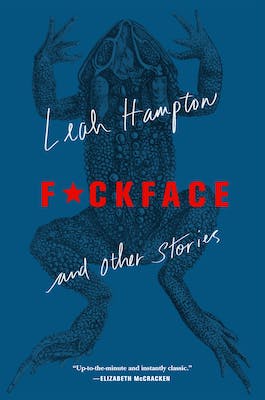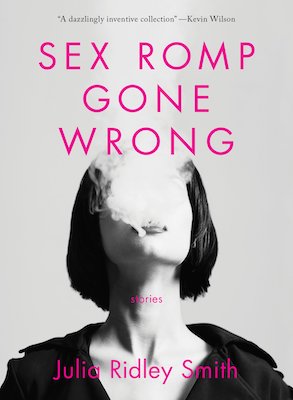8 Literary Book Titles Likely to Rile Book Banners

Several months before my short story collection Sex Romp Gone Wrong was published, I started joking that my new book was already banned in Florida and Iowa. It wasn’t entirely a joke. Both states had recently passed legislation requiring any materials depicting sex to be removed from school libraries. The laws also said schools couldn’t teach younger students about sexual orientation or gender identity.
In the 2022-23 school year, according to Pen America, “over 40% of all book bans occurred in school districts in Florida.†But districts in plenty of other states have also been facing challenges, usually over books that feature characters of color, discuss race or racism, have LGBTQ+ themes, depict or mention sex, or include language the challengers deem offensive.
Often, the folks involved in trying to ban books (who, it should be noted, are a vocal minority) admit they haven’t actually read them. In August 2023, harried administrators in one Iowa school district used AI to try to figure out which of the books under review depicted sex. They didn’t think they could actually read all the books by the new law’s required deadline for removing restricted materials, so they turned to algorithms for help. It would be laughable if it weren’t so terrible.
Sex Romp Gone Wrong is about women and girls at different stages of life, navigating relationships, desire, love, marriage, and motherhood. Yes, there’s sex, some of it queer, and while I wouldn’t go so far as to say my book contains a fuck-ton of cussing, there is a fair bit. I didn’t write the stories for children, and I’ve never expected the book to appear on school library shelves. However, book bans aren’t only affecting school libraries. Last fall the New York Times reported that the American Library Association had noted an increase of challenges to materials in public libraries as well.
Given this surge in anti-book activity, I’m wondering if book challengers will soon be too time-crunched even to run titles through Chat GPT. Will they have to start targeting volumes based on title alone? If so, then I reckon Sex Romp Gone Wrong could be off the shelves, along with a lot of others. Here are 6 literary fiction titles and two memoirs book banners are liable to point their judgey fingers at:
Nightbitch by Rachel Yoder
An artist mothering a two-year-old finds herself transforming into a dog at night. A fractured fairy tale about a stressed-out woman, this novel is also a funny, smart exploration of the difficulties of trying to be an artist while also being a mother. As the story unfolds, the unnamed woman finds powerful new ways of being that are pretty alarming, as well as some that are pretty wonderful. Yoder’s depictions of the joyous, tedious, and highly time-consuming processes of raising children and making art—and the difficulty of summoning the energy to do both at the same time—had me alternately laughing and cringing in recognition.
Hijab Butch Blues by Lamya H
Lamya H is a queer Muslim woman who wears hijab and wrote this memoir under a pseudonym for reasons she explains near the book’s end. Born in South Asia, Lamya moved with her family to the Middle East when she was a small child. There she struggled to fit in with the wealthier, lighter-skinned Arab girls at her school, whose parents told them not to play with her and looked down on her for being brown. At fourteen, she discovered that she could read the Quran in ways that affirmed rather than denied her burgeoning realization that she was queer. This discovery sparked a years-long process in which Lamya’s religion consoled and strengthened her as she immigrated to the United States and searched for a community that welcomed her as a queer person, a brown person, and a person of faith. Her memoir recounts key moments of realizing her queerness, coming out to friends, and making a joyful queer life with her partner and found family. Each of these moments is interwoven with a story from the Quran, illustrating how Lamya’s awakenings resonated with foundational stories of Islam, and how these stories helped shape who she has become.
Shit Cassandra Saw by Gwen E. Kirby
This collection is one of my favorites. Shit Cassandra Saw is full of stories that delight in playing with form, narrative conventions, and reader expectations. Kirby’s imagination seems boundless; her wild, strange, funny tales range through the centuries, lighting on women and girls of today and yesterday who have run out of patience with patriarchal bullshit. Virgins, witches, whores, teachers, moms, adolescent friends—whoever they are, they push back, refusing to accept the fates that men have tried to determine for them. As “Boudicca, Mighty Queen of the Britains†says, “it is not fair that I should change to suit the desires of others.â€
Bastard out of Carolina by Dorothy Allison
This novel, which came out in 1992 and was a finalist for the National Book Award, has already been the target of many a book ban for its depiction of violence and sexual abuse. Yet it has also been widely celebrated for Allison’s raw and knowing depiction of poor white southerners in Greenville County, South Carolina, where she was born and raised. A lesbian who grew up working class, Allison’s searing work refuses to let women like herself and the women who raised her remain invisible.

F*ckface by Leah Hampton
A young lesbian working in a rural grocery store in the North Carolina mountains longs to escape. A park ranger grows weary of finding dead bodies in the woods where she once longed to roam. Set in contemporary Appalachia, Hampton’s stories follow working-class characters whose lives are interdependent with the land in ways city dwellers often don’t think about. Their homeplaces, livelihoods, and health have been devastated by industries like coal mining and hog farming. Some itch to leave, while others stay, aching for what they’ve lost.
Letter to My Transgender Daughter by Carolyn Hays
Carolyn Hays (the writer’s pseudonym) was the mother of four children, and pregnant with another, when a knock on her front door changed everything. An investigator from the Department of Children and Families was following up on an anonymous tip about Hays and her husband. The complaint was that their fourth child was trans, and that her parents were “making†her that way by using her preferred pronouns and allowing her to choose the clothing she wanted to wear.
Hays recounts how she, an academic and writer, and her husband, a soccer coach, learned how to give their daughter what she needed to thrive, as well as what their family did to try to keep her safe. The book offers plenty of scientific and historical research, and talks about recent progress in trans visibility and representation; it also addresses the current climate of growing anti-trans legislation and persistent violence against trans people. Mostly, though, this memoir is an intimate portrait of a large, loving family, written by a mother dazzled and strengthened by her daughter’s joyous certainty about who she is.
Whatever Happened to Interracial Love? by Kathleen Collins
Kathleen Collins was a Black writer, filmmaker, playwright, and activist who died of breast cancer in 1988 at the tragically early age of 46. Nearly 30 years later, Ecco Press published her short fiction in this slim but powerful volume. Collins portrays intellectual Black artists, professors, and professionals in New York during the 1960s through the 1980s, yet the voices feel fresh, in large part because she drops us so quickly and surely inside each character’s consciousness. Voice-driven and economical, her stories waste no time on unnecessary backstory or connective tissue. It’s as though Collins knew she didn’t have much time.
Hell of a Book by Jason Mott
This devastating surreal novel about a famous Black author on book tour who finds himself talking with a figure called The Kid (who may or may not be real) is by turns satirical, horrifying, and thoughtful. It won many awards, including the National Book Award, and is sure to infuriate anyone who doesn’t want to think about our country’s history of racial violence and police brutality.
Read the original article here







